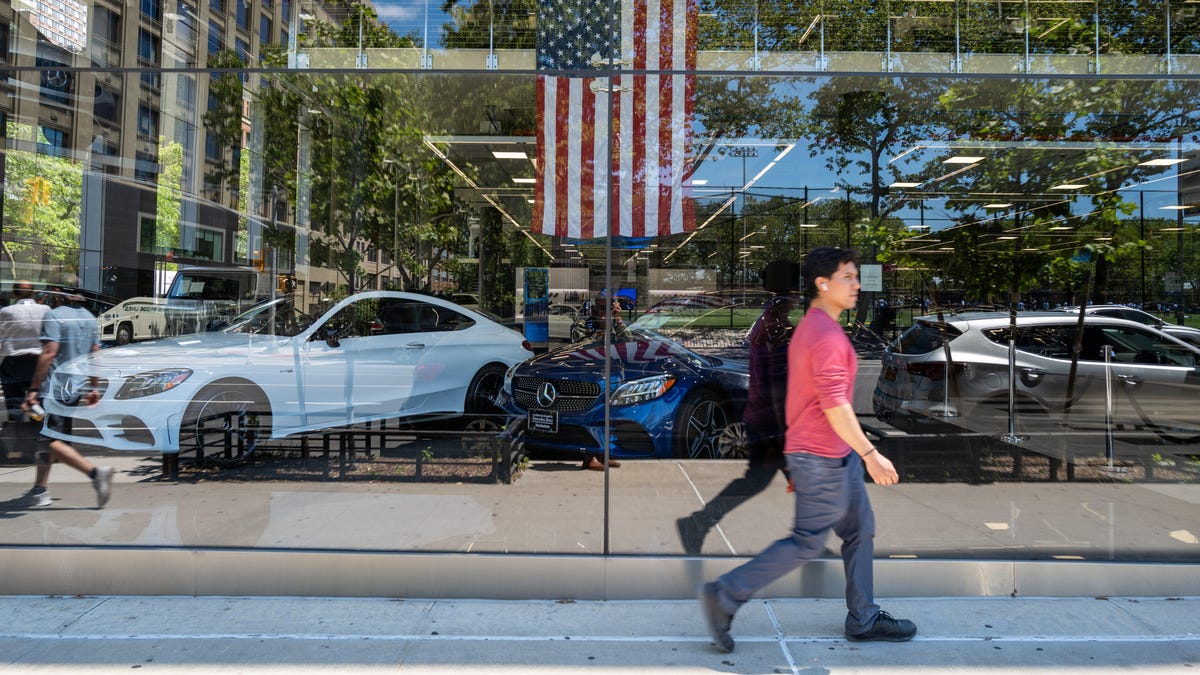Car Sales to Go Down 17 Percent Despite Strong Demand: Report

A person walks by a car dealership on June 10, 2022 in New York City. The Labor Department announced on Monday that consumer prices rose 8.6% last month from a year earlier. Inflation has risen to its highest level in four decades, raising the cost of airfare, hotels, vehicles, gas, and food. Image: Photo By Spencer Platt/Getty Images (Getty Images)
The world runs on supply and demand, and the supply side of things from corn to Camaros are still struggling after the global hit from COVID-19 lockdowns. Cox Automotive readjusted its predictions for the year, and now says 2022 will see fewer cars sold than even 2020.
Car sales are forecast to be down 17.3 percent, according to Cox Automotive. The automotive data giant also revised down the full-year sales forecast from 15.3 million vehicles to 14.4 million units. That’s below the 14.6 million sold in the pandemic year 2020.
It’s been nothing but bad news from Cox lately it seems. Last week, Cox let us know that the average monthly new car payment had hit an astonishing $712. Use car prices are also at record highs. Analysis have been ringing the alarm bells on car prices for two years now, and it looks like there is no end in sight, from the report:
Tight inventory continues to negatively impact new-vehicle sales. Since June 2021, monthly sales volume has been stuck in a tight window, with little deviation, averaging 1.1 million units a month and peaking only at 1.3 million in June 2021. With no clear timeline for any notable recovery in new-vehicle inventory levels, Cox Automotive is lowering its full-year 2022 U.S. auto sales forecast to 14.4 million units, down from its current forecast of 15.3 million. The current forecast now is for new-vehicle sales volumes to fall below the 14.6 million sold in 2020 when the market was initially ravaged by the global COVID pandemic.
“Last June, I wrote that the concern about the supply situation could not be overstated, as we were in untested territory for the market,” said Charlie Chesbrough, senior economist, Cox Automotive. “That sentiment remains, as there has been no significant shift in the conditions on the ground since last fall. Even though economic conditions have worsened in the past months, the lack of supply is still the greatest headwind facing the auto industry today.”
Tight inventory continues to be the cause. Sales have only averaged 1.1 million a month for a year now, and June sales are 7.5 percent lower than last year. The supply chain is still too tight for both consumers’ and manufacturers liking. Ford had to halt production of the Mustang while GM suspended building the Camaro just two months ago. It’s safe to say those are two pretty important models to those automakers.
Some analysis, like Kevin Tynan over at Bloomberg Intelligence, think automakers will never return to pre-pandemic levels of inventory. GM CEO Mary Barra said as much earlier this year, according to GM Authority:
“We’ll never go back to the inventory levels that we were in the past,” Barra said in a recent online chat with Rod Lache, the managing director of business analyst firm Wolfe Research, as quoted by The Detroit Free Press. “In all the tragedy that surrounded COVID, we have learned a lot on how to strengthen our business, run leaner, work with the dealers, use data analytics to make sure dealers are ordering the right vehicle. There are so many elements where we’ve learned to run more efficiently that we’ll never go back from.”
Translation: they’re making too much money to expand inventories now, even if they could.



